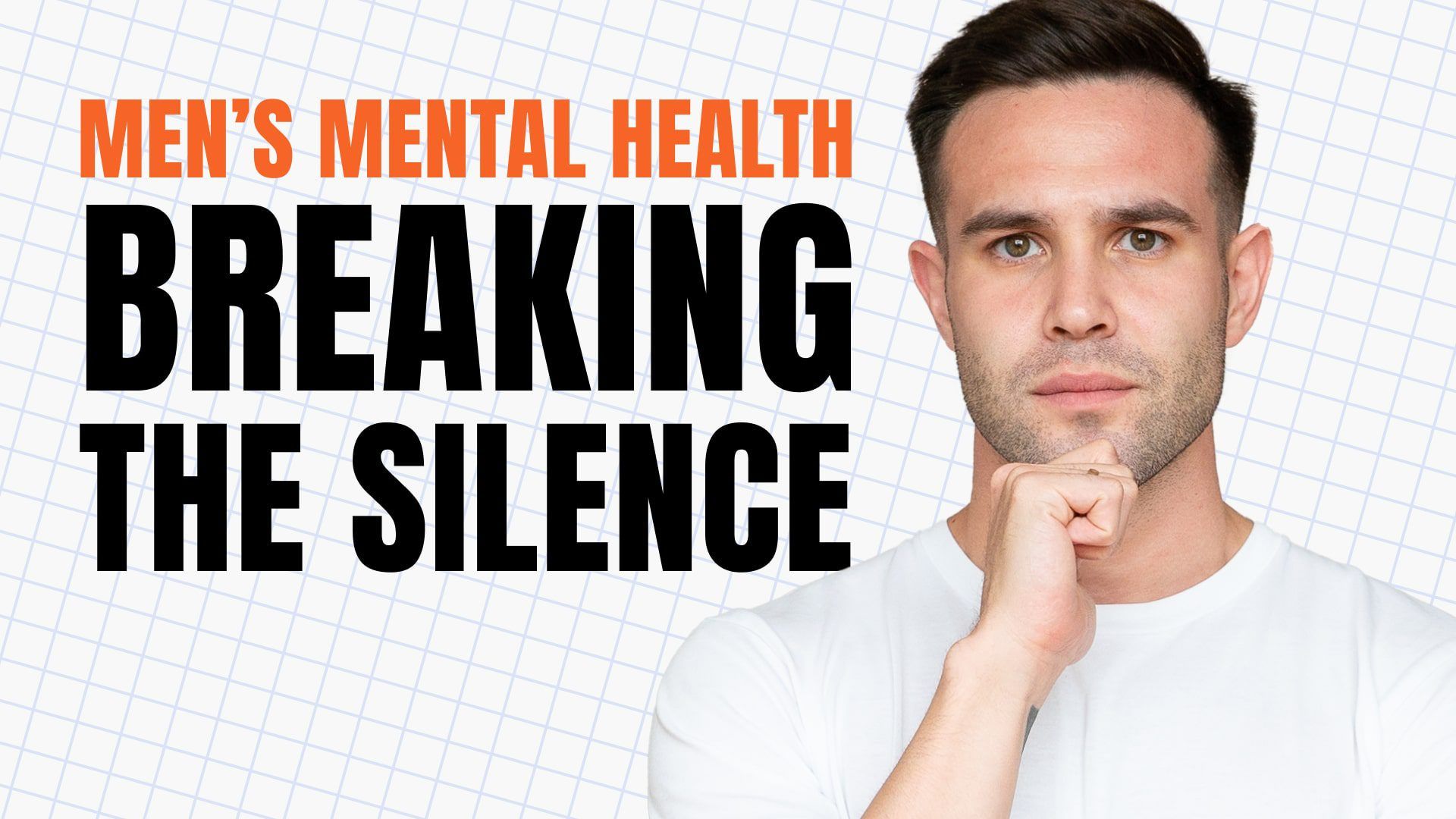Men’s Mental Health: Understanding and Nurturing Men’s Emotional Well-being

Table of contents
In this article, you will learn…
Mental health is just as crucial as physical health, yet it’s often overlooked, especially among men. In this guide, we’ll explore the unique challenges men face when it comes to mental health, including societal pressures and the stigma surrounding mental health issues.
You’ll learn practical strategies to manage stress, recognize signs of mental health concerns, and seek help when needed. We’ll also discuss the benefits of nurturing emotional well-being for a happier, healthier life.
Did you know that men are less likely to seek help for mental health issues, leading to higher rates of untreated conditions?
This article aims to break down those barriers and provide actionable advice for improving mental health.
Don’t like to read? Watch the video!
Key Takeaways:
- Open discussions about mental health help reduce stigma and encourage men to seek the support they need.
- Recognizing the signs of mental health issues, such as persistent sadness, anxiety, or irritability, is the first step toward getting help.
- Effective stress management techniques, including mindfulness, exercise, and social connections, play a critical role in maintaining mental well-being.
- Regular check-ins with mental health professionals are important for early intervention and managing mental health proactively.
- Building a supportive network of friends, family, and colleagues can significantly improve mental health outcomes.
The Stigma Around Men’s Mental Health
Why Men Struggle to Talk About Mental Health
For many men, discussing mental health can feel like admitting weakness, which conflicts with traditional ideas of masculinity. From a young age, boys are often taught to “toughen up” and avoid showing vulnerability. This cultural conditioning makes it difficult for men to open up about their emotional struggles, even when they’re experiencing significant mental health issues.
The reluctance to discuss mental health can lead to feelings of isolation and a sense that they need to manage everything on their own. This internalized stigma not only prevents men from seeking help but also exacerbates their mental health problems, leading to a cycle that’s hard to break. Recognizing that it’s okay to talk about mental health is the first step toward breaking down these barriers.
The Impact of Societal Expectations
Societal expectations play a huge role in shaping how men perceive mental health. The traditional view of men as strong, stoic providers can create immense pressure to appear unbreakable, even when things aren’t going well.
This expectation can lead to the suppression of emotions, as many men feel they must live up to these ideals to avoid judgment or criticism.
The impact of these societal pressures is profound. Men who internalize these expectations may be less likely to express their emotions or seek help, which can result in untreated mental health conditions like depression or anxiety.
Over time, the stress of maintaining these unrealistic standards can contribute to severe mental health issues, making it crucial to challenge and redefine what it means to be a “strong man.”
Recognizing Mental Health Issues
Common Signs and Symptoms
Understanding the signs and symptoms of mental health issues is key to recognizing when you or someone you know might need help.
Common mental health conditions in men include depression, anxiety, and stress-related disorders. These conditions often manifest differently in men compared to women, making them harder to identify.
Symptoms of depression in men might include:
- Irritability
- Anger
- Fatigue
- Changes in sleep patterns
Men might also experience physical symptoms like headaches or digestive issues, which can mask underlying mental health problems. Anxiety can present as:
- Restlessness
- Difficulty concentrating
- Feeling on edge
It’s important to note that these symptoms can vary widely from person to person, and recognizing even subtle changes in behavior can be crucial for early detection.
The Silent Struggle: Why Early Detection Matters
Men are often less likely to seek help for mental health issues, which means they may endure symptoms for longer periods without intervention.
This “silent struggle” can lead to worsening conditions and increase the risk of severe outcomes, including substance abuse or suicide. Early detection and intervention are critical in preventing these outcomes.
Why early detection matters:
- Prevention of escalation: Addressing issues early can prevent them from becoming more severe.
- Better outcomes: Timely support increases the likelihood of successful management of symptoms.
- Breaking the cycle: Early intervention can stop the cycle of silence and suffering.
Recognizing the early signs of mental health issues allows for timely support, whether through professional counseling, support groups, or lifestyle changes. The sooner these issues are addressed, the better the chances of managing symptoms effectively and improving overall well-being.
Practical Strategies for Improving Mental Health
Stress Management Techniques
Managing stress is crucial for maintaining mental health, especially in today’s fast-paced world. Chronic stress can lead to a variety of mental and physical health issues if not addressed. Developing effective stress management techniques can significantly improve your emotional well-being.
Here are some practical strategies to manage stress:
- Mindfulness and Meditation: Practicing mindfulness or meditation can help you stay present and reduce anxiety. Even just a few minutes a day can make a difference.
- Physical Activity: Regular exercise is one of the most effective ways to manage stress. Activities like running, yoga, or even a brisk walk can release endorphins, which naturally reduce stress.
- Time Management: Prioritizing tasks and breaking them down into manageable steps can prevent feeling overwhelmed. Tools like to-do lists or apps can help keep you organized.
- Deep Breathing Exercises: Simple deep breathing exercises can be done anywhere and can quickly calm your mind in stressful situations.
Implementing these techniques into your daily routine can help reduce stress levels and improve your overall mental health.
Building Emotional Resilience
Emotional resilience is the ability to adapt to stressful situations and bounce back from adversity. Building this resilience is key to maintaining mental health over the long term.
Steps to build emotional resilience:
- Develop a Positive Mindset: Focus on what you can control and try to view challenges as opportunities for growth. Practicing gratitude can also help shift your mindset to a more positive outlook.
- Foster Strong Relationships: Having a support network of friends, family, or colleagues you can turn to during tough times is crucial. Strong social connections provide a sense of belonging and support.
- Learn to Adapt: Flexibility is an important part of resilience. Being able to adapt to changing circumstances without getting overwhelmed can help you manage stress more effectively.
- Practice Self-Care: Regularly engaging in activities that you enjoy and that relax you can help you recharge and build resilience against future stressors.
Building resilience doesn’t happen overnight, but with consistent effort, you can develop the strength to handle whatever life throws at you.
Seeking Help and Building a Support Network
Overcoming the Fear of Seeking Help
One of the biggest barriers to men seeking help for mental health issues is the fear of being perceived as weak or vulnerable. However, seeking help is a sign of strength and self-awareness, not weakness.
Ways to overcome the fear of seeking help:
- Educate Yourself: Understanding that mental health issues are common and treatable can reduce the stigma you might feel.
- Start Small: Begin by talking to someone you trust, like a friend or family member, before reaching out to a professional.
- Choose the Right Professional: Finding a mental health professional who understands your concerns can make the process less intimidating. You can start with a primary care physician or a therapist specializing in men’s health.
Remember, seeking help is a proactive step toward better health and a fulfilling life.
How to Build a Supportive Community
Building a supportive community is essential for maintaining mental health. Surrounding yourself with people who understand and support your journey can provide comfort and encouragement.
Steps to build a supportive network:
- Connect with Like-Minded People: Join groups or communities that share your interests, whether online or in-person. This could include hobby groups, fitness communities, or support groups focused on mental health.
- Open Up to Trusted Friends and Family: Don’t be afraid to share your feelings and struggles with those close to you. Letting them know what you’re going through allows them to provide the support you need.
- Seek Out Support Groups: Many organizations offer support groups specifically for men dealing with mental health issues. These groups provide a safe space to share experiences and gain insights from others who understand what you’re going through.
A strong support network can make all the difference in your mental health journey, providing the encouragement and understanding necessary to overcome challenges.
The Long-Term Benefits of Prioritizing Mental Health
Better Relationships and Social Connections
When you prioritize your mental health, you’re not just improving your own well-being—you’re also enhancing your relationships. Good mental health allows you to communicate more effectively, manage conflicts with greater ease, and build deeper connections with others.
Benefits of prioritizing mental health in relationships:
- Improved Communication: When you’re mentally healthy, you’re better able to express your thoughts and feelings clearly, leading to fewer misunderstandings.
- Stronger Empathy: Taking care of your mental health often involves becoming more in tune with your own emotions, which can help you empathize with others and strengthen your relationships.
- Reduced Conflict: Managing stress and emotions effectively can help reduce the frequency and intensity of conflicts in your personal and professional life.
Overall, by taking care of your mental health, you create a foundation for healthier, more fulfilling relationships.
Improved Physical Health and Longevity
Mental health and physical health are deeply interconnected. When you take steps to improve your mental well-being, you’re also likely to see improvements in your physical health.
Physical health benefits linked to good mental health:
- Lower Stress Levels: Reducing stress through mental health practices can lower your risk of stress-related illnesses such as heart disease, high blood pressure, and obesity.
- Better Sleep: Addressing mental health issues can improve sleep quality, which is essential for overall health and longevity.
- Enhanced Immune Function: Managing stress and maintaining a positive outlook can strengthen your immune system, helping you fight off illnesses more effectively.
Prioritizing mental health isn’t just about feeling better emotionally; it’s also a critical component of living a longer, healthier life.
Frequently Asked Questions
How can I start prioritizing my mental health if I’ve never focused on it before?
Starting to prioritize your mental health can feel overwhelming, but small steps make a big difference. Begin by incorporating daily practices such as mindfulness, regular exercise, and taking time to unwind.
It’s also helpful to talk to someone you trust about how you’re feeling and consider seeking professional help if needed. Remember, mental health is a journey, and every step you take toward it is valuable.
What should I do if someone I care about is struggling with their mental health but won’t seek help?
It can be challenging when someone you care about is struggling but unwilling to seek help. The best approach is to express your concern without judgment. Let them know that you’re there for them and offer to help them find resources or support.
Sometimes, providing information about mental health or sharing your own experiences can help them feel more comfortable with the idea of seeking help.
Can improving my diet and exercise habits positively impact my mental health?
Yes, improving your diet and exercise habits can have a significant positive impact on your mental health. Regular physical activity releases endorphins, which can reduce stress and improve mood.
A balanced diet rich in nutrients supports brain health, contributing to better emotional regulation and mental clarity. Simple changes, like incorporating more whole foods and staying active, can make a noticeable difference.
Is it normal to experience setbacks in mental health progress?
Absolutely, experiencing setbacks is a normal part of the mental health journey. Progress is rarely linear, and there will be ups and downs. The key is to remain patient with yourself and to recognize that setbacks don’t mean failure.
When you encounter a setback, try to understand what triggered it and use it as an opportunity to learn and strengthen your coping strategies.
How can I balance work, personal life, and mental health?
Balancing work, personal life, and mental health requires intentional planning and boundaries. Set clear work hours and ensure you make time for activities that help you unwind, such as hobbies, exercise, or spending time with loved ones.
Prioritize tasks to manage your workload and avoid burnout. It’s also important to regularly check in with yourself to ensure you’re maintaining a healthy balance.
What are some signs that I might need professional mental health support?
If you’re experiencing persistent feelings of sadness, anxiety, or hopelessness, or if you’re finding it difficult to manage daily tasks, it might be time to seek professional support.
Other signs include significant changes in sleep or appetite, withdrawal from social activities, or using substances to cope with emotions. Professional help can provide you with the tools and support you need to manage these challenges effectively.
Conclusion and Summary
Prioritizing your mental health is one of the most important steps you can take for a happier, healthier life.
By recognizing the challenges men face, understanding the signs of mental health issues, and taking practical steps to manage stress and build resilience, you can improve your well-being and strengthen your relationships.
Remember, seeking help is a sign of strength, and building a supportive network is crucial for maintaining your mental health over the long term.
I encourage you to take the first steps today—whether it’s talking to someone you trust, incorporating mindfulness into your routine, or seeking professional help. Your mental health matters, and by taking care of it, you’re investing in a brighter, more fulfilling future.
If you have any questions or need further guidance, don’t hesitate to reach out. I’m here to help you on your journey to better mental health. Visit my blog and social media channels for more guides, tools, and tips designed to support your physical and mental well-being.
Works Cited, Relevant Links, and Studies
- American Psychological Association. (2018). The role of masculinity in men’s mental health.
- Centers for Disease Control and Prevention. (2020). Mental health: Men’s mental health.
- Harvard Health Publishing. (2018). The importance of physical health for mental well-being. Harvard Medical School.
- Mayo Clinic. (2020). Mental health: Recognizing and managing mental health.
- National Institute of Mental Health. (2019). Men and mental health.
- Substance Abuse and Mental Health Services Administration. (2020). Coping with stress during COVID-19.
- The Mental Health Foundation. (2021). How to look after your mental health.
- World Health Organization. (2019). Mental health and substance use.
This is a personal blog. I am not a doctor, fitness coach, nutritionist, or trained health professional. The information I share is based on my personal experience, self-research, and insights from working with health and wellness professionals. My content is for informational and entertainment purposes only and is not intended as health advice.
Always consult with your healthcare provider before making any significant changes to your health routines or treatments. I am not liable for any actions taken based on this information.
With that said, your well-being is my top priority. Stay healthy and take care!
Credits and Team















Leave a Reply